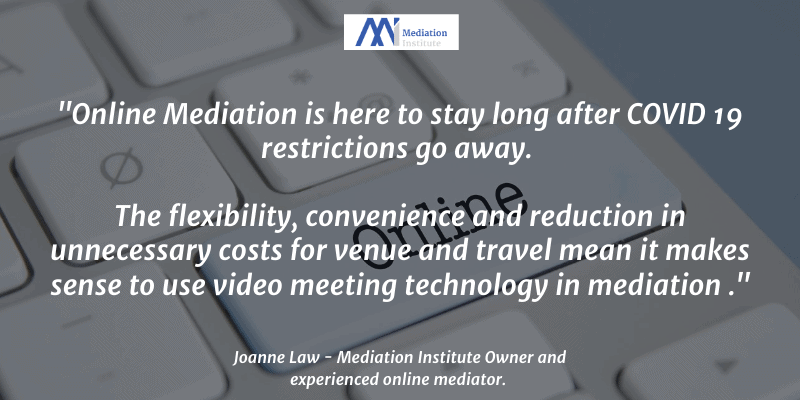
One of the silver linings for the dark clouds of COVID-19 has been the forced digitisation that many industries have experienced. Things that have been talked about for years have been done in days or weeks. Some think that things will go back to the way they were when the restrictions on travel and meeting in person imposed by COVID-19 are lifted. I don’t believe that, do you?
Zoom and other virtual meeting platforms have proved themselves in many ways during the lock downs of 2020 and will continue to be relied upon and that includes in mediation.
The team at Mediation Institute are innovators so we have been using online mediation for training and with clients for several years now due to the flexibility, convenience and time saving nature of meeting online.
What are the challenges?
There are some challenges.
Unreliable Internet
The patchy and sometimes limited access to the internet is one. When working with clients it is a great idea to consider co-mediation until the internet is more reliable. That way you won’t risk the mediator dropping out of a meeting leaving adversarial clients alone together. If you are worried about that affecting your fees there are plenty of interns or new mediators who would be willing to volunteer to co-mediate in exchange for gaining experience. It is unlikely that co-mediators located in different places would both drop out at the same time so you are protected from Internet issues.
In your opening statements you should ensure that everyone knows what to do if there is a drop out. Confirm the number to call if they can’t immediately reconnect and inform them that the process will cease until they can rejoin.
Co-mediation is such a robust model and made incredibly easy with online mediation.
Client Reluctance
I think this is a bit of a myth especially after the forced digitisation caused by COVID-19 restrictions. I’ve been offering online mediation for over five years now. When I first started I had to sell the benefits to clients, many of whom were not familiar with online meetings other than Skype. Now I rarely have to even have a conversation about it beyond telling them that is how it is going to be.
I am hearing that many services have reverted to phone mediation as their go to. This is a much less satisfactory solution than video. On video it is easier to establish rapport, monitor the clients emotional state and check for disengagement or reaction.
I believe that the main barrier is reluctance but it is on the part of mediator who have not upskilled and feels uncomfortable using technology in the mediation process rather than clients. Those mediators who have abstained from using online mediation during the pandemic remind me very much of the mice in the classic change management fable “Who moved my cheese?”
If you are not familiar with the story you can purchase the book from many places or find summaries for free on the internet. https://www.amazon.com.au/Moved-Cheese-Spencer-M-D-Johnson/dp/0091816971/ref=pd_sim_14_1/355-0458449-1515111

Privacy
We can’t 100% guarantee that there is no one else in the physical room. We should set the expectation that they are alone in our agreement to mediate but we all know that sometimes people don’t do what they are told.
However if the observer out of range of the camera is quiet and doesn’t intrude into the mediation, what harm is really done? What is discussed and negotiated in mediation is inadmissible in most courts and situations. They can’t use what they hear as evidence if the mediation fails. The mediator should be competent and acting ethically so any additional ears are not going to be a problem.
Likewise recording. That is not something we can guarantee isn’t done even in face to face mediation as everyone caries a recording device, their smart phone, which they can use to covertly record. Online we can prevent them recording the meeting using zoom but they could set up audio or even video recording using other technology. Again we need to think about the consequences – something said, proposals or offers in mediation are inadmissible. So what are the potential consequences?
Participants in mediation should be permitted to talk through the mediation with their professional advisors and circle of intimacy family or close friend. If they hear what is said rather than get the filtered version there may actually be benefits. I’m not saying we should encourage undisclosed listeners but if they are there you most likely have a client who is prone to high conflict behaviour. If advisors get the real story rather than the version filtered through their reactive mindset there is less risk that those people will undo the agreement afterwards with their incomplete understanding of the basis on which agreement is reached.
Children present a challenge in the mediation I do as I mainly do family dispute resolution. All I can do is be alert to a child coming into the room and stop until the parent can see to their needs and send them out again.
What are the benefits?
There are many. Let’s make a list!
- No need to travel with the associated wasted time for all concerned.
- No overhead costs of either leasing a mediation center or hiring for the session.
- No hassles with negotiating additional time in a hired mediation space if you do go a bit over and then negotiating getting paid by the clients for the extra fees.
- Clients who don’t live near each other can mediate effectively from anywhere in the world.
- The process is much less stressful for clients, especially if there has been family violence or abusive behaviour between them. That means people who would normally have refused mediation will give it a go.
- The lower stress process means that people who may have been reactive and rigid in their thinking are able to be more open and creative in their problem solving and option generation.
- Sharing documents and looking at information is much easier with the mediator able to share their screen and display the spreadsheet begin used to visualise a settlement or agreement being drafted or contract that is being discussed.
- The after mediation work is reduced as you can draft onto a document directly rather than handwriting and transcribing.
- Shorter sessions can be scheduled. I don’t usually offer more than three hours at a time. This avoids unsustainable “agreement by exhaustion” where parties are willing to sign anything in order to get out of an all day mediation session. I find that type of mediation ethically challenged in that self-determination may be compromised.
Online Mediation is a skill
From a practical point of view it is relatively easy to use Zoom. If you set up correctly so that you restrict what clients are able to do with the platform to what you want to allow, security issues are largely managed.
It is critical that you turn on the waiting room function with zoom so that no one enters the virtual room unless you allow them.
If you are running a multi party mediation turn on the breakout rooms function so that they can speak privately among themselves, when you allow that.
Mediation Institute has several options available to assist members to learn Online Mediation skills.
Our Video Meeting Facilitation Course is designed to help build the skills with the opportunity for hands on practice.

This course is only $33 for Mediation Institute Members. It is included in our major courses as gift with purchase.
$330 for non-members so make sure you log in if you are a member and want to enrol. https://www.mediationinstitute.edu.au/product/video-meeting-facilitator-course/

Techy Tuesday for Mediators is a chance to ask any and all of your technology related questions related to online mediation, making the most of Microsoft Office tools or anything else related to working as a mediator.
As with all the Mediation Institute professional development web meetings, Techy Tuesday’s are free for Mediation Institute Members and Students.
We also welcome members sharing your tips and tricks.

